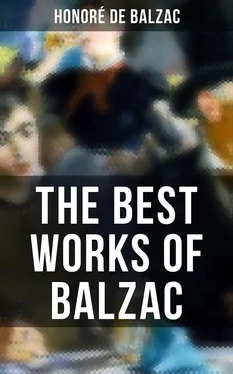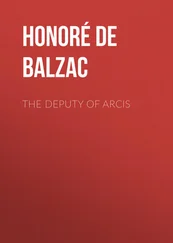The graceful attitude and expression of the young man were not lost on the commandant, who exclaimed as he pressed towards him: “Come on, opera-dancer, come on, and let me crush you!”
The royalist leader, provoked by his momentary disadvantage, advanced with an angry movement, but at the same moment the men who were about him rushed forward and flung themselves with fury on the Blues. Suddenly a soft, clear voice was heard above the din of battle saying: “Here died Saint-Lescure! Shall we not avenge him?”
At the magic words the efforts of the Chouans became terrible, and the soldiers of the Republic had great difficulty in maintaining themselves without breaking their little line of battle.
“If he wasn’t a young man,” thought Hulot, as he retreated step by step, “we shouldn’t have been attacked in this way. Who ever heard of the Chouans fighting an open battle? Well, all the better! they won’t shoot us off like dogs along the road.” Then, raising his voice till it echoed through the woods, he exclaimed, “Come on, my men! Shall we let ourselves be fooled by those brigands?”
The word here given is but a feeble equivalent of the one the brave commandant used; but every veteran can substitute the real one, which was far more soldierly in character.
“Gerard! Merle!” added Hulot, “call in your men, form them into a battalion, take the rear, fire upon those dogs, and let’s make an end of this!”
The order was difficult to obey, for the young chief, hearing Hulot’s voice, cried out: “By Saint Anne of Auray, don’t let them get away! Spread out, spread out, my lads!” and each of the two wings of the Blues was followed by Chouans who were fully as obstinate and far superior in numbers. The Republicans were surrounded on all sides by the Goatskins uttering their savage cries, which were more like howls.
“Hold your tongues, gentlemen,” cried Beau-Pied; “we can’t hear ourselves be killed.”
This jest revived the courage of the Blues. Instead of fighting only at one point, the Republicans spread themselves to three different points on the table-land of La Pelerine, and the rattle of musketry woke all the echoes of the valleys, hitherto so peaceful beneath it. Victory might have remained doubtful for many hours, or the fight might have come to an end for want of combatants, for Blues and Chouans were equally brave and obstinate. Each side was growing more and more incensed, when the sound of a drum in the distance told that the body of men must be crossing the valley of Couesnon.
“There’s the National Guard of Fougeres!” cried Gudin, in a loud voice; “my man has brought them.”
The words reached the ears of the young leader of the Chouans and his ferocious aide-de-camp, and the royalists made a hasty retrograde movement, checked, however, by a brutal shout from Marche-a-Terre. After two or three orders given by the leader in a low voice, and transmitted by Marche-a-Terre in the Breton dialect, the Chouans made good their retreat with a cleverness which disconcerted the Republicans and even the commandant. At the first word of command they formed in line, presenting a good front, behind which the wounded retreated, and the others reloaded their guns. Then, suddenly, with the agility already shown by Marche-a-Terre, the wounded were taken over the brow of the eminence to the right of the road, while half the others followed them slowly to occupy the summit, where nothing could be seen of them by the Blues but their bold heads. There they made a rampart of the trees and pointed the muzzles of their guns on the Republicans, who were rapidly reformed under reiterated orders from Hulot and turned to face the remainder of the Chouans, who were still before them in the road. The latter retreated slowly, disputing the ground and wheeling so as to bring themselves under cover of their comrades’ fire. When they reached the broad ditch which bordered the road, they scaled the high bank on the other side, braving the fire of the Republicans, which was sufficiently well-directed to fill the ditch with dead bodies. The Chouans already on the summit answered with a fire that was no less deadly. At that moment the National Guard of Fougeres reached the scene of action at a quick step, and its mere presence put an end to the affair. The Guard and some of the soldiers crossed the road and began to enter the woods, but the commandant called to them in his martial voice, “Do you want to be annihilated over there?”
The victory remained to the Republicans, though not without heavy loss. All the battered old hats were hung on the points of the bayonets and the muskets held aloft, while the soldiers shouted with one voice: “Vive la Republique!” Even the wounded, sitting by the roadside, shared in the general enthusiasm; and Hulot, pressing Gerard’s hand, exclaimed:—
“Ha, ha! those are what I call veterans !”
Merle was directed to bury the dead in a ravine; while another party of men attended to the removal of the wounded. The carts and horses of the neighborhood were put into requisition, and the suffering men were carefully laid on the clothing of the dead. Before the little column started, the National Guard of Fougeres turned over to Hulot a Chouan, dangerously wounded, whom they had captured at the foot of the slope up which his comrades had escaped, and where he had fallen from weakness.
“Thanks for your help, citizens,” said the commandant. “God’s thunder! if it hadn’t been for you, we should have had a pretty bad quarter of an hour. Take care of yourselves; the war has begun. Adieu, friends.” Then, turning to the prisoner, he asked, “What’s the name of your general?”
“The Gars.”
“Who? Marche-a-Terre?”
“No, the Gars.”
“Where does the Gars come from?”
To this question the prisoner, whose face was convulsed with suffering, made no reply; he took out his beads and began to say his prayers.
“The Gars is no doubt that young ci-devant with the black cravat,—sent by the tyrant and his allies Pitt and Coburg.”
At that words the Chouan raised his head proudly and said: “Sent by God and the king!” He uttered the words with an energy which exhausted his strength. The commandant saw the difficulty of questioning a dying man, whose countenance expressed his gloomy fanaticism, and he turned away his head with a frown. Two soldiers, friends of those whom Marche-a-Terre had so brutally killed with the butt of his whip, stepped back a pace or two, took aim at the Chouan, whose fixed eyes did not blink at the muzzles of their guns, fired at short range, and brought him down. When they approached the dead body to strip it, the dying man found strength to cry out loudly, “Vive le roi!”
“Yes, yes, you canting hypocrite,” cried Clef-des-Coeurs; “go and make your report to that Virgin of yours. Didn’t he shout in our faces, ‘Vive le roi!’ when we thought him cooked?”
“Here are his papers, commandant,” said Beau-Pied.
“Ho! ho!” cried Clef-des-Coeurs. “Come, all of you, and see this minion of the good God with colors on his stomach!”
Hulot and several soldiers came round the body, now entirely naked, and saw upon its breast a blue tattooing in the form of a swollen heart. It was the sign of initiation into the brotherhood of the Sacred Heart. Above this sign were the words, “Marie Lambrequin,” no doubt the man’s name.
“Look at that, Clef-des-Coeurs,” said Beau-Pied; “it would take you a hundred years to find out what that accoutrement is good for.”
“What should I know about the Pope’s uniform?” replied Clef-des-Coeurs, scornfully.
“You worthless bog-trotter, you’ll never learn anything,” retorted Beau-Pied. “Don’t you see that they’ve promised that poor fool that he shall live again, and he has painted his gizzard in order to find himself?”
Читать дальше












